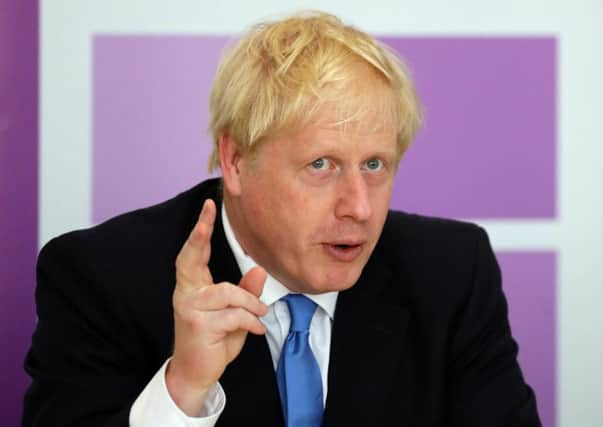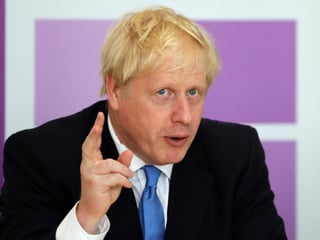How Boris Johnson’s Brexit strategy is helping the SNP – John McLellan


It’s not what the Scottish Conservative party wants, but thanks to the voters of Brecon & Radnorshire and the UK Government’s spending splurge, my prediction last week of a General Election on 10 October might not be far off the mark.
Over the past week, as well as the announcement of a £2bn Brexit war-chest, informed sources have indicated that new Number 10 strategy chief Dominic Cummings and Chancellor Sajid Javid are preparing for a budget on Tuesday, 8 October to finalise emergency measures in advance of a no-deal departure on 31 October. Last week’s pledges to recruit 20,000 extra police officers in England and Wales, a high-speed rail link between Leeds and Manchester and reversing £4bn cuts in the schools budget (where was the Scotland Office announcement of the resultant increase in Scottish funding?) felt like a pre-election spree, rather than a new administration with years ahead to achieve its goals.
Advertisement
Hide AdAdvertisement
Hide AdDowning Street knows the guillotine will fall on 31 October if the Brexit promise is not kept and an early October budget should not be couched as grim emergency measures for chaos ahead, but as investment plans and a glimpse of what life will be like once the nation awakes from the Brexit nightmare. It would then be possible for the election to be held the following week and it was noticeable that in his Times column yesterday, former Scotsman editor Iain Martin, whose connections with senior Conservatives in London are extensive, noted the window for Prime Minister Boris Johnson to hold an election of his choosing was either 10 or 17 October.
The Brecon by-election result makes this even more likely because although Plaid Cymru and the Greens stepped aside to give the anti-Brexit Lib Dems ticket a clear run, the Conservative candidate Christopher Davies only lost by 1,425 votes, despite being recalled by 18,000 constituents after admitting fraudulent expenses claims. The Conservative vote might have dropped 9.6 per cent, hardly surprising when the candidate was disgraced, but Labour’s striking 12.4 per cent collapse demonstrated the opportunity to exploit the disarray within the Opposition. But clearest of all is the evidence that the main obstacle to Brexit is the Brexit Party itself. Had it not been for the Faragists’ 3,331 votes, even a candidate who had fiddled his expenses would have beaten the EU Alliance candidate and the message going into a General Election before 31 October will be clear – vote Brexit to stay in Europe. After 31 October, it simply won’t work.
Could there be a pro-EU, pro-independence, pro-climate emergency SNP-Green pact for a General Election in Scotland? Quite possibly and, at the same time, a Lib Dem resurgence here could split the Unionist vote and lead to a second independence referendum, certainly if Scottish Conservatives waste energy thinking about a separate party.
On the basis that Brexit voters realise their new party will torpedo its only reason to exist and vote Conservative and the North of England gives up on Labour, on 18 October we could wake up to a UK Government with a mandate to leave the EU and the SNP with a Green-tinged mandate for another tilt at separation.
Greens adopt Victorian segregation of sexes?
Edinburgh’s Green Party is leading the charge against the voting rights of Church representatives in the City Council’s education committee, leading to Archbishop Leo Cushley’s condemnation of the move being read at every Mass last Sunday.
The principle of non-elected members having a vote on a council committee apart, it’s not clear what specific problem the move is designed to cure, but like the Church it seems the Edinburgh Greens are traditionalists at heart. A recent office reorganisation in the City Chambers puts male and female Green councillors in different rooms, so perhaps they’d like “boys “and “girls” carved above the doors like Victorian schools.
Edinburgh’s concert hall conundrum
Least surprising news of the week is the application by the St James Centre developers Nuveen Real Estate for a judicial review of the decision to grant planning permission to the Dunard Concert Hall by Edinburgh Council. As I wrote here last year, the plan was inconsistent with several policies which the council and heritage lobby chose to ignore.
Advertisement
Hide AdAdvertisement
Hide AdThe plot behind Dundas House on St Andrew Square is too small for a 1,000-seater concert hall, and the resulting access difficulties, dominance of the listed building to which it will be attached, and the concrete to be used would all be serious issues for other projects. But not this one. Dunard chairman Sir Euan Brown says he is “disappointed” by the move, but he will have been aware Nuveen was unlikely to simply roll over. Disappointed, but probably relaxed because most of the council’s policies aren’t law and it can breach its own guidelines if “on balance“ the benefits are subjectively judged to outweigh the problems. The judicial review might go in favour of the concert hall, but the real difficulty for Edinburgh Council is it will lay the foundations for appeal after appeal against rejections.
Drugs free-for-all is not the only way forward
New figures this week show over 1,000 Scottish drug addicts are prescribed heroin substitute methadone every day, further fuelling the debate about drug legalisation to tackle Scotland’s addiction crisis.
The Scottish Parliament Information Service statistics revealed an average of 1,114 prescriptions were dispensed daily in 2018-19, an annual total of 406,588, which is actually a drop from the peak of 534,674 in 2010-11.
Many of these prescriptions are being administered in prison and, although the shameful 27 per cent rise in drug-related deaths to 1,187 last year included many older addicts on the methadone programme, it’s clear that not all drug deaths fit the narrative of despairing, broken lives.
The core problem seems to be the normalisation of drug-taking at all levels, which feeds the argument that if it has become so normal why should possession remain a crime? Readers of this column may recall my analysis two months ago of the most recent data, which illustrated Police Scotland’s pragmatic approach to minor possession. While 14,500 cannabis possession crimes were recorded in Scotland in 2017-18, averaging just 6g each, the total number of all drug prosecutions was just 6,233 and as a significant number will be for Class A drugs it can be assumed that around 10,000 cannabis possession incidents went no further.
Is a free-for-all the only way forward? The methadone programme suggests otherwise.
